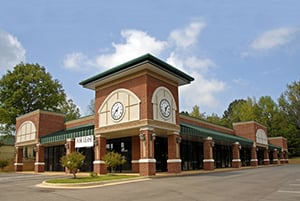Reviewed by: Melanie DiVirgilio
One of the biggest questions when deciding on a home for your business is whether to lease or buy. Ultimately, the answer comes down to each individual situation. Both options have pros and cons, so it is important to consider the following factors when considering whether it is right for your business to lease or buy a property.
 One of the most important factors in deciding whether to lease or purchase commercial property is your expected time horizon in a given location. Leasing offers flexibility, allowing you to exit at the end of a term with minimal obligation—but that convenience often comes at a premium.
One of the most important factors in deciding whether to lease or purchase commercial property is your expected time horizon in a given location. Leasing offers flexibility, allowing you to exit at the end of a term with minimal obligation—but that convenience often comes at a premium.
On the other hand, if your business plans to remain in the same space for several years, ownership may offer greater financial advantages. In fact, many experts estimate that buying becomes more cost-effective than leasing after approximately seven years. It’s also important to consider that as an owner, you’ll be responsible for any unexpected repairs or maintenance, which can impact your overall costs.
Purchasing commercial real estate is a significant financial commitment, but it can also be a strategic investment in your business’s future. In addition to the property itself, upfront costs typically include a mortgage down payment, legal fees and other closing expenses. While these initial costs may seem substantial—especially for newer businesses—they should be weighed against the long-term value of owning a property, including potential equity growth and stability. For many business owners, the decision to buy is not just about space, but about building a foundation for future financial strength.
In terms of financing, a conventional owner-occupied commercial real estate loan typically requires a down payment of around 20%. However, if your business qualifies for an SBA 504 loan, that requirement may be reduced to just 10%. This can make ownership more accessible for growing businesses with limited capital, while still allowing you to build equity in a property that supports your long-term goals.
With a lease, you'll be responsible for a security deposit, and possibly even a broker's fee, depending on how you found the property. These amounts, while variable, will be far lower than those required when making a purchase.
One of the most compelling advantages of purchasing commercial real estate is the opportunity to build equity over time. Unlike leasing, where monthly payments contribute solely to the landlord’s investment, owning a property allows your business to accumulate value in a tangible asset. If you select a strategic location and your space needs don’t require extensive customization, your building could appreciate significantly over the years.
After the typical seven-year break-even point, many business owners find themselves in a strong financial position—whether they choose to sell the property for a profit or lease it out to generate passive income. This flexibility can turn your commercial real estate into a reliable revenue stream and provide a return on investment that leasing simply cannot match. For businesses with long-term vision, ownership can be a powerful tool for wealth creation and financial stability.
Leasing can offer flexibility for growing businesses. If your company needs to expand quickly, your landlord may be able to accommodate additional space within the same property or portfolio. In contrast, owning a building means that if you outgrow the space, you’ll need to explore options such as selling, leasing it out, or purchasing a new property. However, ownership also gives you full control—allowing you to renovate or reconfigure the space as needed to better suit your evolving business needs.
Your projected space requirements should factor into your overall real estate strategy. If you anticipate growth or operational changes in the near future, leasing may provide the agility you need while giving you time to build capital for a future purchase. Planning ahead ensures your real estate decisions support both your short-term operations and long-term goals.
 A benefit of leasing a property is that your landlord will negotiate factors like ongoing maintenance. If you don't want to be on the hook for calling plumbers, or you'd prefer not to have to deal with securing the building should a storm come, pay the additional amount of rent to have peace of mind. On the other hand, buying a building means you are free to customize, personalize, and choose from any services that you want.
A benefit of leasing a property is that your landlord will negotiate factors like ongoing maintenance. If you don't want to be on the hook for calling plumbers, or you'd prefer not to have to deal with securing the building should a storm come, pay the additional amount of rent to have peace of mind. On the other hand, buying a building means you are free to customize, personalize, and choose from any services that you want.
You'll also want to consider the location carefully when buying -- with a lease, should the neighborhood not pan out, you can move, but with a purchase, you'll have to relocate and may have trouble selling the property for the amount you paid.
No matter what choice you make in finding a location for your business, the right resources are out there to make every dream a reality. Contact us to learn more about our commercial real estate loan offers, and get your business settled in a new home today.
Are you interested in contacting a local, Florida banker to discuss your individual financial needs? We’d love to speak with you. Schedule a consultation today.
Share: